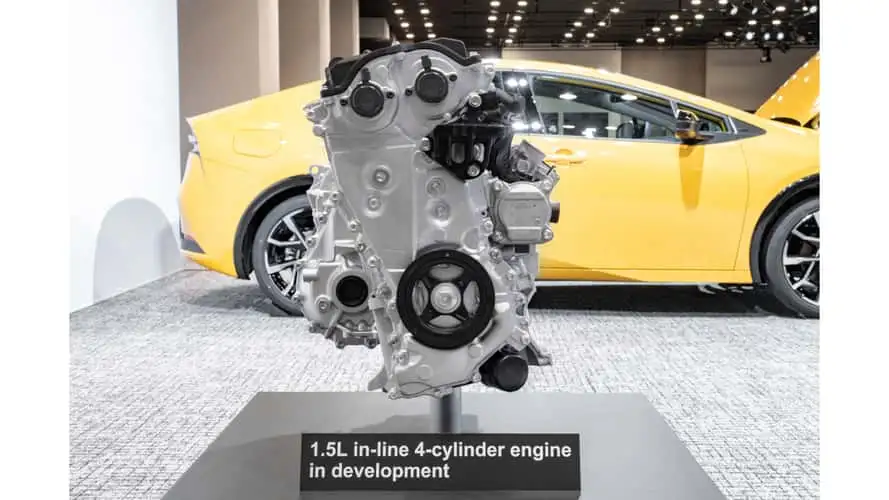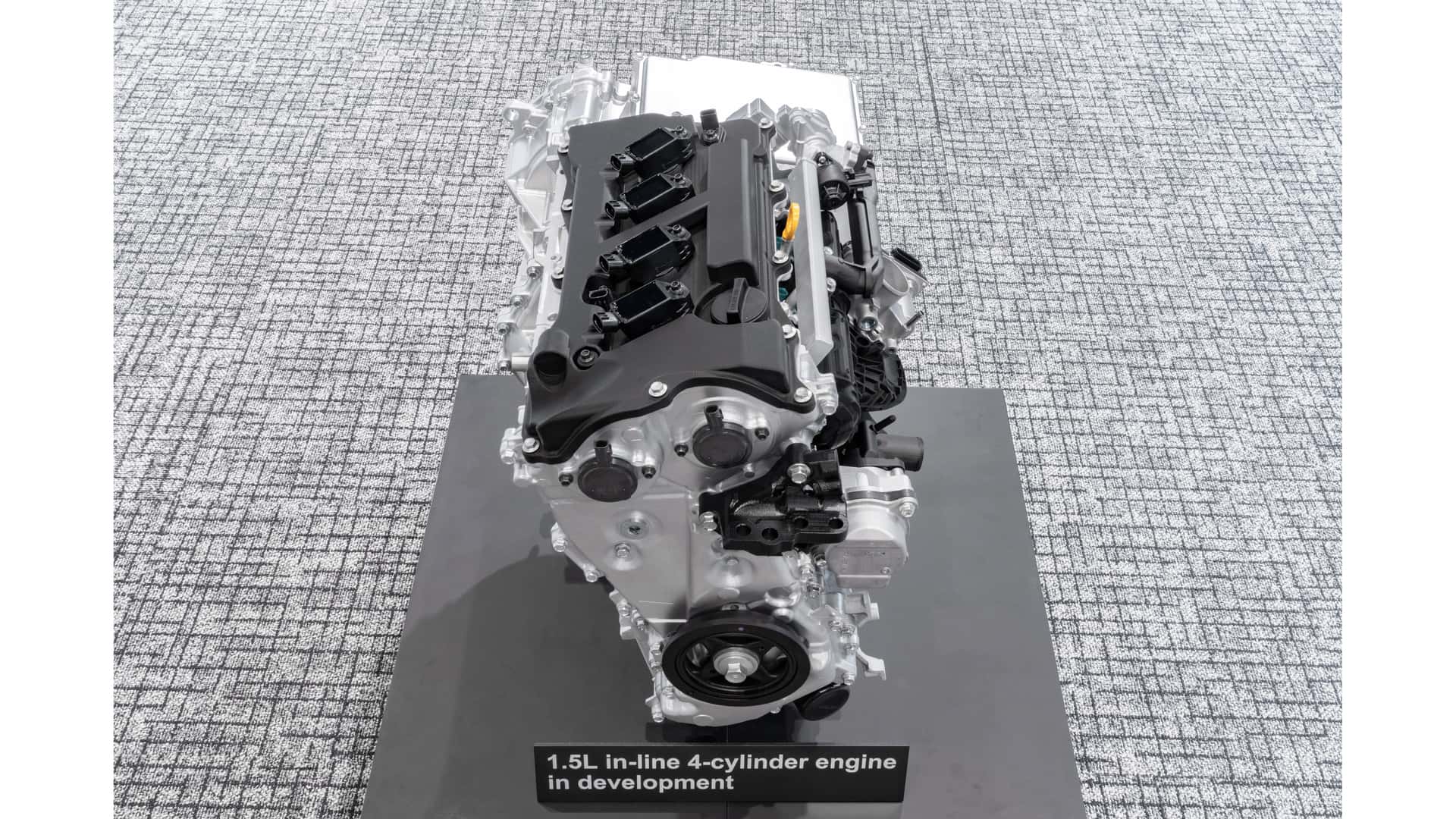
Posted on 08/13/2025 7:11:07 AM PDT by Red Badger

Toyota is adamant that the internal combustion engine still has a bright future despite the rise of electric vehicles. The world’s largest carmaker has reaffirmed its long-term commitment to ICE by partnering with fellow Japanese brands Subaru and Mazda on a new family of gas engines. Smaller and lighter four-cylinder units are touted as a “game-changer solution” by the company’s Chief Technology Officer, Hiroki Nakajima.
We now know the Japanese automotive giant plans to use the upcoming 1.5- and 2.0-liter engines in nearly every conceivable type of powertrain. Toyota Europe Vice President of Product Strategy and Marketing Andrea Carlucci told Automotive News the new hardware’s versatility is key: “We are trying to optimize the new engine for any type of application, whether it’s electric, hybrid, or hydrogen.”
While the idea of a gas engine in an electric application might sound odd, a plausible scenario exists. Toyota is likely referring to extended-range electric vehicles (EREVs), where the combustion engine doesn’t drive the wheels but instead serves solely as a generator to recharge the battery on the go. This setup allows the engine to run at optimal speeds for maximum efficiency. Examples include the BMW i3 REX, the Ramcharger, Mazda MX-30, Scout’s upcoming truck and SUV, and Nissan’s models equipped with E-Power tech.
Toyota has already announced plans to sell extended-range electric vehicles in China through its local joint venture with GAC, giving the Highlander SUV and Sienna minivan the EREV treatment. These models are expected to use a small engine that isn’t mechanically connected to the wheels. Instead, propulsion will come exclusively from electric motors, with the engine serving only to extend range without abandoning gasoline entirely.
Toyota achieved 41 percent thermal efficiency back in 2018 and could be aiming to improve that figure further. Its next-generation engines will run not only on fossil fuels, but also on biofuel, hydrogen, and synthetic fuel. Beyond full hybrids and EREVs, Toyota is also exploring long-range plug-in hybrids, with Carlucci estimating that 62 miles (100 kilometers) without sipping any gasoline represents the “tipping point.”
Confirmed engines include naturally aspirated and turbocharged 1.5-liter units, along with a larger 2.0-liter turbo. Efficiency won’t be the only focus as the latter will also have a performance version for Gazoo Racing (GR) models, delivering up to 600 horsepower in race cars.
New Toyota four-cylinder engines


Carlucci also discussed vehicle architectures:
“Everybody has taken an ICE platform and turned it into something that is electrified to some degree. So, why not conceive a platform that is EV-native and see how much we can adapt it to be used for a plug-in hybrid or a full-hybrid without sacrificing any of the new platform’s strengths?”
Of course, dedicated electric platforms are nothing new. Tesla is the obvious example, but there’s also Volkswagen Group’s MEB, Hyundai and Kia’s E-GMP, and Mercedes’ EVA, among others. Additionally, some EV-native platforms can also accommodate combustion engines, such as Stellantis’ STLA Small, Medium, Large, and Frame. Scout’s upcoming models fit this category, as will VW Group vehicles on the forthcoming Scalable Systems Platform (SSP).
Much like Toyota chairman Akio Toyoda, who has famously said EVs will never exceed a 30 percent market share, Carlucci maintains that electric cars are not the sole path to decarbonization. He argues for powertrain diversity, giving customers the freedom to choose: “We will not push EVs in markets where there is no demand.”
Extended range ev?…seems like a regular petroleum vehicle to me…starting with a fully charged petroleum battery🤷🏼♂️🤷🏼♂️🤷🏼♂️
Ah, memories of thermodynamics class.
“Internal combustion engines really work at peak efficiency at one RPM and one load. Of course, this makes them pretty good for charging batteries.”
My 750 hp 5.0 has two sweet spots.
60 mph in 6th gear - 28 mpg.
Any gear at 7500 rpm.
What is in the Lexus LC500?
Isn’t that a 5 liter V8 ?
I have a 2012 Tacoma Double Cab long bed. Currently 122K miles. I have replaced two parts on it. The smog pump twice.
The first time Toyota replaced it for free. I finally replaced the front brakes at 93K miles. Back drums are the original.
I am not a fan of the new 2.2 liter 4 cylinder turbo engine YET. I think I will stick with the 4 liter V6 in the 2012.
I rented the same car in Boise last month. It was a really nice car to drive. After three days of driving around the metro Boise/Nampa/Caldwell I used $10 in gasoline. Not even 3 gallons.
That Camry was a blast to drive.
I asked the Google:
“The Lexus LC 500 is equipped with a 5.0-liter V8 engine, producing 471 horsepower and 398 pound-feet of torque. This engine, known as the 2UR-GSE, is paired with a 10-speed Direct Shift automatic transmission. It’s a naturally aspirated engine, meaning it doesn’t rely on forced induction like turbochargers or superchargers.”
“Extended range ev?…seems like a regular petroleum vehicle to me…starting with a fully charged petroleum battery”
Nope. Drive train is fully electric.
My Christmas Tree train does
“We are back to vehicles that hit the junkyard at 100K miles because of transmission and computer issues.”
Which ones are those? All vehicles I know of seem to last way beyond 100k miles.
New Tacoma and Tundras are not same. Lots of drive train problems even before warranty expires.
My brother has a 2016. 150k
My 2010 is bulletproof. 160k 4l6. I test drove a 2025....not impressed at all. Felt weak.
“I test drove a 2025....not impressed at all. Felt weak.”
Years ago I test drove a Mustang. I was not impressed with the 5.0 versus my 4.6.
Turned out I never put it in Sport mode.
It also had a 3.55 rear end versus my 3.73.
We put 165,000 on our Honda Odyssey and 250,000 on our Honda Pilot. We cried when our cars could not pass inspection in Maine (too much rust on the under carriage). So we bought the Honda CR-V. Our son bought the Honda HR-V for his first car. Given our ages he will probably inherit the CR-V with fewer than 50,000 miles.
Evidently, our new hybrid has two electruc batteries
I don't know about the TVs, but China is the biggest buyer of EVs. However, this is mostly due to price and tariffs. Over half of all electric cars sold in China now cost less than similar gasoline-powered models.
“Evidently, our new hybrid has two electruc batteries”
A 12v for auxillaries and a high voltage for propulsion.
Ahhh..
I Have not even seen it yet...I let the hub purchase without much input from me.
I would be interested in a Gen-Set for when the Texas weather knocks out the powerlines. As for a vehicle if they can offer one that isn’t an uplink to the “Social Credit Scoring” system I might be interested.
Disclaimer: Opinions posted on Free Republic are those of the individual posters and do not necessarily represent the opinion of Free Republic or its management. All materials posted herein are protected by copyright law and the exemption for fair use of copyrighted works.